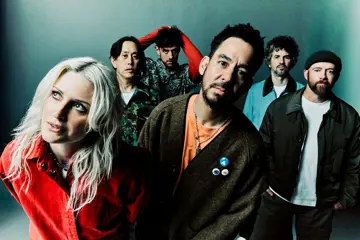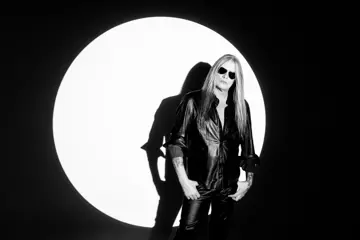Passion and emotional intensity are displayed commonly enough in songs of romantic love and grief, but they are rarely observed in songs of spiritual devotion. Such is the case with the qawwali music as performed by Asif Ali Khan & Group. Qawwali, a form of Sufi devotional music dating back at least 700 years, is mainly performed at Sufi shrines and religious festivals in Pakistan and India, and is designed to connect spiritually with its listeners for extended periods of time. Khan, a student of Nusrat Fateh Ali Khan -- the larger-than-life Pakistani singer fêted for bringing the genre to the attention of international audiences in the '80s and '90s – plays the Punjabi Ang form of qawwali like his late master.
Together with his nine-men strong qawwali party, he sits cross-legged on a Persian rug spread on the ground. Khan and three other vocalists – two of whom also play the harmonium (a small portable hand-pumped keyboard instrument) – sit in the front row, and the rhythmic section, consisting of percussionist and handclapping chorus, sit in the back row. In a brief introduction, they explain that all they share comes from within them. And although the messages that follow in the spoken words of their songs may be initially lost due to language barrier, the power and passion of their music soon embrace and draw the audience in with driving, finely attuned rhythms.
Two harmoniums, a table and dholak (hand drums with tensioning rope lacing around) plus energetic handclapping are all that accompany Khan and the singers' full-throated vocals to mesmerising effect. Their voices regularly rise to a feverish level and fall instantly to a quiet whisper in the space of a heartbeat, often reinforced through Khan's expressive, skyward hand gestures. In the tradition of attending a qawwali party's performance, the audience is invited to show their appreciation by slipping donations under a cushion positioned at the front of the stage throughout the concert. For their final song, they invite everyone to stand on their feet and join the chorus with their clapping, paying tribute to the spirit of the music itself.
Although each musical item runs for up to 15 minutes, Khan's impassioned, wide-ranging vocals and fierce concentration don't reveal even the slightest hint of exhaustion. It is not hard to imagine that he could easily continue on in his master's vision and successfully take qawwali music across borders much further afield.
Don't miss a beat with our FREE daily newsletter















